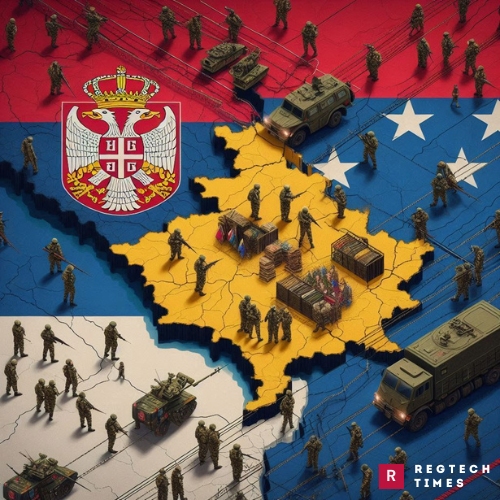The complex relationship between Serbia and Kosovo remains a significant point of tension in the Balkans, rooted in historical grievances, ethnic divides, and geopolitical maneuvering. Kosovo, which declared its independence from Serbia in 2008, is still viewed by many Serbians as an integral part of their country. This sentiment has the potential to reignite conflict in a region already fraught with historical strife.
Historical Context: The Kosovo War and NATO’s Role
Kosovo’s path to independence began in the late 1990s when tensions between ethnic Albanians and Serbians escalated into armed conflict. The Kosovo Liberation Army (KLA) fought against Serbian forces, leading to widespread violence and human rights abuses. In response, NATO intervened in 1999 without UN Security Council authorization, launching a 78-day bombing campaign aimed at stopping the humanitarian crisis. The campaign resulted in significant civilian casualties, with around 500 civilians killed.
Despite the loss and devastation, NATO’s intervention succeeded in forcing Serbian forces to withdraw from Kosovo, paving the way for the region’s eventual declaration of independence in 2008. However, Serbia has never recognized this independence, maintaining its claim over Kosovo as a Serbian province. This ongoing dispute is visible in the pervasive presence of slogans like “Kosovo is Serbia,” which can be seen throughout Serbia, including prominently at Belgrade’s Nikola Tesla Airport.
Ethnic and Political Divides
Kosovo’s population is predominantly ethnic Albanian, but it is also home to a significant Serbian minority, primarily in the northern region near the Serbian border. This demographic divide has perpetuated tensions, as the Serbian minority often looks to Belgrade for support, while the Albanian majority aligns with Western nations and NATO. The situation is further complicated by the presence of various ethnic enclaves and the historical significance of Kosovo to Serbian national identity.
The Serbian government frequently voices its intent to reclaim Kosovo, stirring nationalist sentiment and raising fears of renewed conflict. This rhetoric resonates deeply with many Serbians, who view the loss of Kosovo as a historical injustice that must be rectified.
Geopolitical Implications and Russia’s Influence
The geopolitical landscape in the Balkans is further complicated by Russia’s involvement. Russia, a traditional ally of Serbia, has provided loans and political support, sharing Serbia’s antipathy towards NATO. This relationship is symbolized by the widespread presence of Russian President Vladimir Putin’s image in Serbia, where he is often depicted as a friend and ally.
U.S. Sanctions Bosnian Serb Nationalist Leader Milorad Dodik and his Network of Firms
Russia’s strategic interest in the Balkans is clear: destabilizing the region could divert NATO’s attention from its eastern front, particularly Ukraine, where Russia is engaged in ongoing conflict. A new war in the Balkans would strain NATO resources and potentially weaken Western support for Kyiv. As a result, Serbia’s grievances and nationalist aspirations make it a convenient tool for Russia to exploit in its broader geopolitical strategy.
The Risk of Renewed Conflict
The risk of renewed conflict in the Balkans is not merely theoretical. Tensions have been simmering for months, with increased military activities and nationalist rhetoric heightening the stakes. Serbian President Aleksandar Vučić has frequently discussed the possibility of reclaiming Kosovo, while Kosovo’s Prime Minister Albin Kurti has warned of troubling Serbian activities near the border.
Serbia Reaffirms Solidarity with Ukraine but Refrains from Sanctions Against Russia
In May 2023, Kurti explicitly mentioned the potential for a new conflict, highlighting the increased military presence and aggressive posturing by Serbian forces. These developments are alarming for the international community, as any escalation could lead to a broader regional conflict.
NATO and Western Concerns
Western countries and NATO are acutely aware of the risks posed by the volatile situation between Serbia and Russia. NATO’s involvement in Kosovo has been long-standing, with peacekeeping forces remaining in the region to maintain stability. However, the prospect of renewed conflict threatens to undermine these efforts and destabilize the broader region.
NATO’s 2.7 Billion MK Airbase Project Near Ukraine and Crimea is Strategic Stronghold in Europe
The European Union, which has been closely involved in mediating between Serbia and Kosovo, continues to support Kosovo’s independence. However, the EU’s influence is limited by Serbia’s steadfast refusal to recognize Kosovo’s sovereignty and the strong nationalist sentiments within the country.
The situation remains a volatile issue with deep historical, ethnic, and geopolitical roots. The potential for conflict is a cause for concern for NATO and Western countries, as well as a point of interest for Russia. As Serbia continues to grapple with its past and its aspirations for the future, the Balkans stand on the edge of a precarious balance, with the potential for significant upheaval should tensions escalate further.
The international community must remain vigilant and proactive in addressing the underlying issues that perpetuate this conflict. Diplomatic efforts must focus on fostering dialogue and reconciliation between Serbia and Kosovo, while also addressing the broader regional dynamics that contribute to instability. Only through sustained and concerted efforts can the risk of renewed conflict be mitigated, ensuring a more stable and peaceful future for the Balkans.


